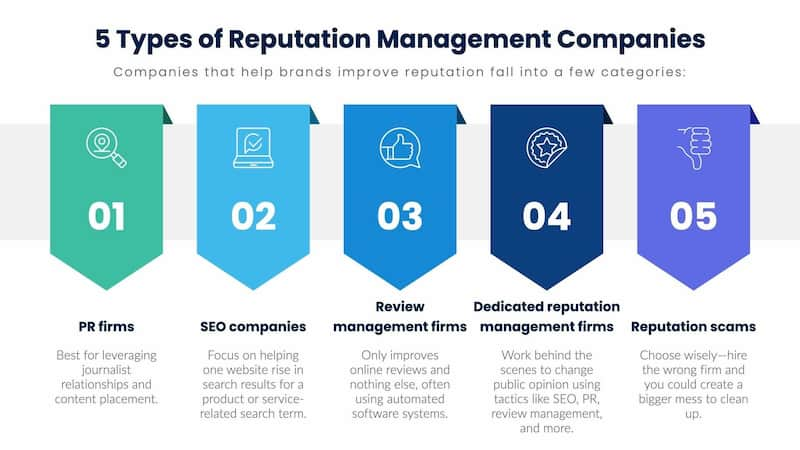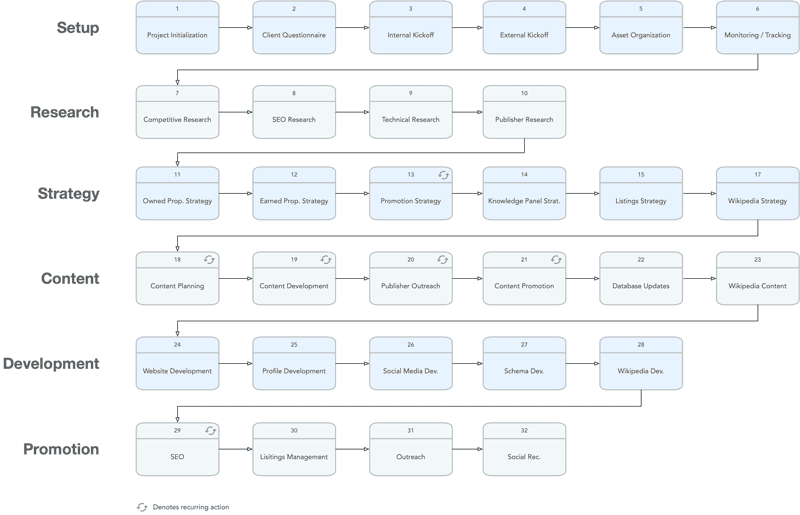The Best Reputation Management Companies ? How to Make the Right Choice
It can be challenging to find the best online reputation management company for your needs. This article explores the things you should keep in mind when exploring the best fit.
1. Geographic Location
It matters where a reputation management company is located because the people doing the work must understand the language, customs, and laws pertaining to the location where the client is based.
For example, a company with employees based in the United States may not be the best fit for reputation management work in a French-speaking country in Africa.
It’s important to know where the company is really located. Many offshore companies say they are US-based when they are not. If legal issues arise, the location of the company can become important, especially if they are not where they say they are.
An example of legal issues often arises when reputation management companies buy domains for the client but do not transfer ownership during or at the end of the project.
We have seen instances where reputation management firms held clients “hostage” by holding the client’s assets in hopes of a big payoff.
If the company you are dealing with is in a country where legal attempts to reclaim assets are simple, it’s better for you. Of course, the best reputation agencies never own the assets they purchase for you, instead, they direct you to buy them or at least turn over the domains and content to you early.
Before working with a reputation agency, ask them where they are located and where their employees are located.
2. Diverse Range of Services
A proficient reputation management company should offer a diverse range of services tailored to meet your specific needs.
These services could include search result suppression, where the company works to push down negative content in search engine rankings, making it less visible to the public.
They may also provide Wikipedia page monitoring and editing to ensure that the information presented on this heavily trafficked site is accurate and positively reflects your image.
Other services could include negotiation for the removal of harmful content from search results and the internet at large.
They also often offer the promotion of positive content to elevate your online presence, SEO tactics to enhance your visibility on search engines, as well as content development to continuously generate fresh and engaging material that aligns with your brand.
They’ll also know how to implement a successful review and ratings management campaign.
It’s important to choose a reputation management company that provides these comprehensive services to ensure your online image is effectively maintained and promoted.
3. Customized Strategies
Every company and individual has unique online reputation management needs, so selecting a reputation management company that creates customized strategies tailored to your situation is crucial.
This means understanding your goals, target audience, and industry in order to develop the most effective plan for managing and improving your online reputation.
Avoid companies that offer a one-size-fits-all approach, as this may not effectively address your specific needs and goals.
4. Experience and Track Record
When considering a reputation management company, it’s important to research their experience and track record in the industry.
Look for companies that have successfully managed reputations in your field or industry, as they will have a better understanding of the challenges and nuances specific to your online image.
Additionally, ask for case studies or examples of their past work to get a better sense of their capabilities and success rate.
While most reputable reputation management companies do not share the names of their clients, ask to sign an NDA if necessary to get all of the information you can before committing. The best reputation companies have been in business for at least ten years and have worked with hundreds of diverse clients.
5. Transparent Communication
Effective communication is crucial when working with a reputation management company. You want to choose a company that keeps you informed every step of the way and promptly responds to any questions or concerns you may have clearly and concisely.
Avoid vague or elusive language about their methods and results, as this is probably a red flag for unethical practices. A reputable reputation management company will provide regular updates on their progress and be transparent about their strategies and techniques.
6. Guarantees Offered by Reputation Management Companies
Promises of guaranteed results should be approached with caution when selecting a reputation management company.
It’s important to understand that no company has a special relationship with search engines that enables them to assure specific outcomes. Search engine algorithms are complex and continually evolving, which makes it impossible to guarantee specific search result placements.
Companies making such guarantees may rely on tactics that could potentially harm your online reputation in the long run, such as keyword stuffing or dubious backlink strategies.
These tactics might provide quick results, but they’re not sustainable and can lead to penalties from search engines that do you more harm than good.
Instead of focusing on companies that promise guarantees, look for those that emphasize their proven strategies, track record, and commitment to ethical practices. These companies will focus on creating high-quality content and building a holistic online presence for your brand, which are the keys to long-term success in managing and improving your online reputation.
7. Documented Procedures and Clear Processes
An essential aspect to consider when selecting a reputation management company is whether they have clearly documented procedures and processes for achieving your goals.
The best reputation management companies maintain transparency by providing their clients with an outline of the intended plan of action right from the start. This detailed roadmap should include clear steps and timelines for each phase of the process, from initial assessment and strategy development to implementation and monitoring.
A comprehensive and well-designed plan assures you that the company has a structured approach to managing and improving your online reputation. It also allows you to understand exactly what work is being done when it is being done, and what the anticipated outcomes are.
Look for a solid organization
This level of organization and documentation reflects the company’s professionalism and competence, giving you confidence in their ability to deliver results. Avoid companies that do not offer a clear process or seem to operate reactively; reputation management requires strategic planning and execution, which is best demonstrated through a systematic and transparent process.
A Plan Means Better Communication
Lastly, having a documented plan allows for effective communication and feedback between you and the company. You can actively participate, provide input, and make informed decisions throughout the process, which ultimately helps create a more successful and collaborative relationship.
8. Ethical Methods
Ensure that the company uses ethical methods for reputation management. Avoid companies that promise to remove negative reviews or use black hat techniques. These methods may provide short-term results, but they can harm your long-term online presence and even lead to penalties from search engines. Reputation management should focus on building a positive online image through creating high-quality content and promoting it through ethical means.
9. Dedicated Team Leadership
Just like any other service-oriented company, a good reputation management company should provide excellent customer service. They must be responsive to your questions, provide quick and effective solutions, and be available for communication when needed.
A good rule of thumb is to make sure you have a dedicated Project Manager assigned to your campaign rather than working with salespeople or with a floating team. Many companies in the reputation management space have high turnover, so finding one with a stable team that can stay with you through the entire process will make the experience much better.
10. Adaptable Strategies
Search results change, and so should strategies during the campaign. The digital landscape is highly dynamic, making adaptability a crucial attribute for a reputation management company. They should have the ability to adjust their strategies based on changing trends and the specific needs of your business. This includes staying updated on the latest search engine algorithms and social media trends that can affect your online reputation.
A reputable company can also provide customized solutions for your specific industry or niche, as every business’s online presence is unique. Avoid companies that offer a one-size-fits-all approach, as this may not be effective in managing and improving your online reputation. A tailored strategy, on the other hand, will yield better results and provide a more personalized approach to your brand’s online reputation management.
11. Reasonable Pricing
Some reputation management firms fleece their customers by making big claims and asking for huge up-front deposits. A good reputation management company will charge between $4,000 and $8,000 per month for between six and twelve months. You should start to see positive change within about 45 days of initial publishing. It may seem like a hefty investment, but it’s important to remember that managing and improving your online reputation is an ongoing process. A reputable company will be transparent about their pricing and not require large deposits or long-term contracts upfront. Always do your research and compare pricing among different companies to ensure you are getting a fair deal.
The cheaper the reputation management company, the worse your outcome will be. But it’s also true that companies that charge tens of thousands of dollars per month are usually not worth it either, unless the campaign is for a global company with significant reputational problems.
Conclusion
Selecting the right reputation management company is crucial for maintaining and improving your online image. Consider factors such as documented procedures, proven success stories, ethical methods, responsive customer service, adaptable strategies, and reasonable pricing when researching and choosing a company to work with. Remember to do thorough research and ask for references before making a decision. With the right reputation management company by your side, you can effectively manage your online presence
Tags: Online Reputation Management Services, Reputation Management.


